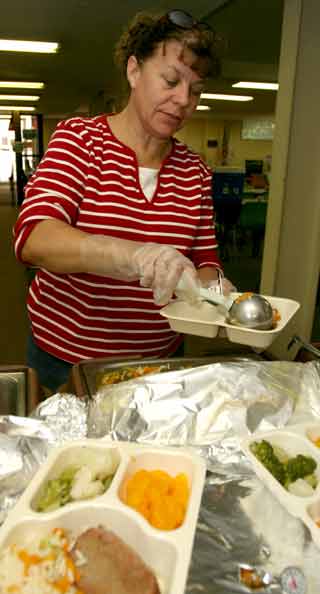Peace meal funded in pieces
If Rhea Adams can be sure of one thing, it is that every Monday through Friday, a balanced meal will arrive on her doorstep at the same time each day.
“You know, it’s pretty much of a habit to eat at a certain time and so it arrives about the same time everyday, so you look forward to that time,” Adams said.
Adams, 84, a resident of Charleston, has received meals from the Peace Meal program for more than four years.
Barbra Wylie, director of the Peace Meal program, said the program provides more than home delivered meals.
Peace Meal also provides assessment of needs, nutrition education and congregate meals, which are meals where seniors can eat in a social setting.
The program also offers outreach programs to adults 60 years of age and more.
Peace Meal is sponsored in part by a grant from the Older Americans Act in addition to federal and state funding through Eastern’s School of Family and Consumer Sciences.
Kathy Lentz, assistant director of Peace Meal, said the university has been a longtime supporter.
As time went on, Peace Meal found that funding from sponsors was not enough.
When the program started in 1974, it was completely funded by a grant from the Older Americans Act, Wylie said.
The Older Americans Act is a federal nation-wide program that funds many senior programs like Peace Meal.
Today, less than half of Peace Meal’s funding is covered by the Older Americans Act and state funds. The remaining funds must be raised or come from donations.
Some of that money comes from participant contributions.
“We request a donation of $3 per meal from anyone who receives our services, either congregate or home delivered meals,” Wylie said. “No one is turned away for an inability to pay, so our average would probably only be a little over $2 per meal.”
The rest of the program’s fundraising is done in various other ways.
Wylie said Peace Meal receives funds from the county boards, cities, towns and villages they serve, although this is not required.
Peace Meal asks all communities that have Peace Meal sites to donate to help feed the seniors in their area.
The program also receives donations from private contributions and other grant sources.
This year, the Retirement Research Foundation provided the Peace Meal program with a $68,000 grant in the form of two new delivery vehicles.
As costs continue to rise, fundraising becomes more crucial to the Peace Meal program.
“Our costs keep going up, and our state and federal funding has largely remained stagnant,” Wylie said. “I mean, we may see small increases but not increases that keep pace with increased cost of doing business.”
The costs of doing business include food purchases and staff pay, Wylie said.
Many of the staffing issues occurred when minimum wage increased in Illinois in 2007.
As a result, Peace Meal had to increase the wages of all staff members.
Another effect on the program’s costs was the rise in gas prices, Wylie said.
She said Peace Meal workers try to use company cars when possible because it is less expensive than mileage reimbursement. The overall cost is much lower than when staff drive their own cars, Wylie said.
Because of these increased costs, Peace Meal has to raise about $475,000 this year.
Jane Johnson, office manager for Peace Meal, has worked for the program for 30 years and said if it did not fundraise, Peace Meal would not be able to serve its participants.
The Peace Meal program serves approximately 372,000 meals to 6,000 people throughout the course of a year, Wylie said.
The program serves meals at noon every Monday through Friday and covers a 14-county region across east central Illinois.
Wylie said fundraising is how Peace Meal keeps its doors open.
“Without it, we aren’t here and we don’t feed seniors, and that’s what we’re here to do,” Wylie said.
Adams, who worked at Eastern as an administrative secretary for 37 years, has had meals delivered to her home since she broke her hip and it became inconvenient for her to go to the grocery store.
One of Adams’ favorite meals is the ham-and-bean soup.
“They make an awfully good bean soup,” Adams said.
“To provide quality meals for healthier lives” is the program’s mission statement.
A registered dietitian approves all the meals and ensures there is a good balance of all the necessary nutrients, Wylie said.
One thing that scares us sometimes is that we’re aware that we may be the only meal that some people have in a day,” Wylie said.
Because of this realization, the program believes it is important that the meals make up one-third of the participant’s dietary needs.
“We’re helping their nutrition; we’re helping them maintain independence; we’re improving their quality of life,” Wylie said.
Peace meal funded in pieces

Paula Coffey, Site Supervisor, prepares some food for Peace Meal Wednesday morning at the Senior Center underneath the Elks Lodge. Around 1,500 meals are given out a day to senior citizens in surrounding counties a day.





































































